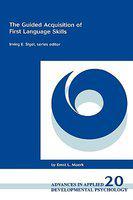
NEWS: Chatbots.org survey on 3000 US and UK consumers shows it is time for chatbot integration in customer service!read more..
The Guided Acquisition of First Language Skills
Advances in Applied Developmental Psychology

First Sentence:
The overall goals of the present book are integrative in four senses: (a) an integration of broader developments in overall world views or the Zeitgeist of the last centuries with the epistemological positions in first language research, (b) an integration of past and present empirical language acquisition research with reference to the analyses presented under the preceding section, (c) an integration of contributions from diverse schools of psychology to encompass both the behaviors and the underlying rather stable cognitive schémas of language and its acquisition, and finally (d) an integration of domains of language acquisition research is tentatively envisaged wherein differential acquisition across social classes and diverse cultures are related to findings from typical first and second language transmission/acquisition.
Language is in the training, claims Ernst L. Moerk, Professor Emeritus of Psychology at California State University. Moerk provides abundant evidence that, from birth, children learn to use language by practicing conversation with their caretakers, taking their cues from negative and positive reinforcement. Moerk clears away the speculation of the “nativist” theories of language acquisition by presenting an extensive review of research, leaving the reader with a cogent theoretical framework that thoroughly explains the human ability to converse.
New Comment
Only registered members are allowed to comment. or login
or login
